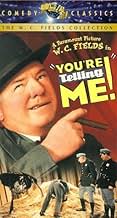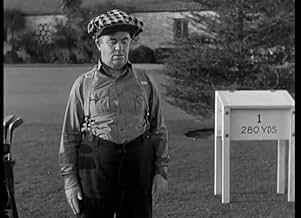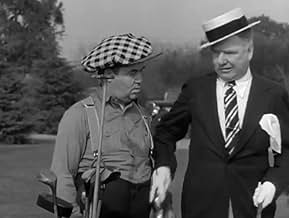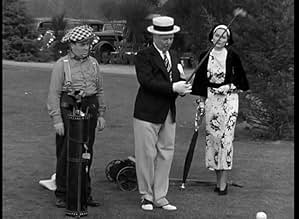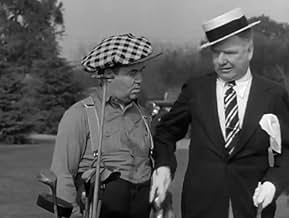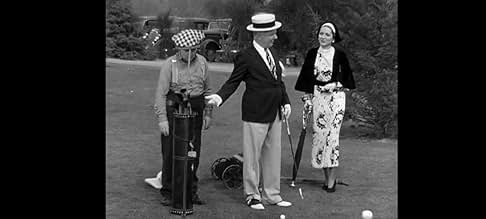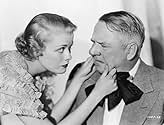NOTE IMDb
7,4/10
1,3 k
MA NOTE
Ajouter une intrigue dans votre langueA hard-drinking, socially-awkward inventor wrecks his daughter's chances of marriage into a rich family and bungles his own chances of success by selling one of his more practical inventions... Tout lireA hard-drinking, socially-awkward inventor wrecks his daughter's chances of marriage into a rich family and bungles his own chances of success by selling one of his more practical inventions.A hard-drinking, socially-awkward inventor wrecks his daughter's chances of marriage into a rich family and bungles his own chances of success by selling one of his more practical inventions.
- Réalisation
- Scénario
- Casting principal
- Récompenses
- 1 victoire au total
Buster Crabbe
- Bob Murchison
- (as Larry 'Buster' Crabbe)
Dell Henderson
- Mayor
- (as Del Henderson)
Robert McKenzie
- Charlie Bogle
- (as Robert Mc Kenzie)
William Bailey
- Tire Company Executive
- (non crédité)
Eddie Baker
- First Motorcycle Cop
- (non crédité)
Dorothy Bay
- Mrs. Kendall
- (non crédité)
Harold Berquist
- Doorman
- (non crédité)
Don Brodie
- Waiter
- (non crédité)
Elise Cavanna
- Sarah Smith - Female Gossip
- (non crédité)
Avis à la une
In the few W. C. Fields movies that I've seen, he doesn't disappoint. I can now add to that "You're Telling Me!", wherein he plays an optometrist-inventor whose daughter's marriage plans get complicated by her fiance's mother's snobbish attitude. The protagonist's attempt to show his latest invention to some execs further complicates things. More zaniness follows.
It's not any sort of profound movie, and doesn't try to be. It's just funny. Fields, despite his personal problems, always managed to be entertaining. You're sure to like this one.
It's not any sort of profound movie, and doesn't try to be. It's just funny. Fields, despite his personal problems, always managed to be entertaining. You're sure to like this one.
10gregvw
This is one of the funniest films I've ever seen. Fields stars as Sam Bisbee a liquor-loving inventor who is trying to sell his puncture-proof (actually bullet-proof) tires to a major corporation. The son of a wealthy socialite proposes to Bisbee's daughter, only to be foiled by his mother when she encounters the uncouth Bisbee. On top of ruining his daughter's potential marriage, Sam also loses his car and several other inventions and mistakenly shoots the tires of a police car. The resolution involves a princess, Bisbee running down mainstreet with an ostrich on a rope, and a classic Fieldsian attempt at hitting a golf ball (which somehow results in a pie getting stuck to his hat.)
Do yourself a favor and see this movie!
Do yourself a favor and see this movie!
You're Tellling Me finds W.C. Fields pitted against the world again, the immediate world and the outside world. And Fields fights it with the weapons of his choice, rye or gin. You're Telling Me actually does get a bit serious for a while.
He's Sam Bisbee in this film, ne'er do well optometrist and full time henpecked husband of Louise Carter and father of Joan Marsh. Joan would like to marry Buster Crabbe who's the son of the town's leading snob Kathleen Howard, but it looks hopeless.
Fields's one love besides his family and booze is inventing things. He actually may have something in a puncture proof tire. But in a demonstration where he shoots the tires of a police car it gets him in some trouble.
Here's actually where this Fields comedy takes a serious turn. He's actually contemplating suicide on the way back home on the commuter train, but then seeing a young lady Adrienne Ames in distress and contemplating the same thing, he talks her and ironically himself out of it. She turns out to be his guardian angel in many ways and turns the tide for new friend socially and economically.
This was first the first film Fields did with Kathleen Howard. Someone at Paramount must have seen something because the following year they were teamed as husband and wife in It's A Gift. She became Fields's Margaret Dumont in that one.
You're Telling Me is the film where Bill Fields got do his golf routine which is almost as famous as his pool shark specialty. It comes at the end of the film where a contrite town who just thought of him as the town drunk, now asks him to open their new country club. It's still holds very well today and a source of amusement for duffers everywhere.
In fact the whole film is as amusing as it was when it premiered in 1934. The comedy of W.C. Fields is timeless.
He's Sam Bisbee in this film, ne'er do well optometrist and full time henpecked husband of Louise Carter and father of Joan Marsh. Joan would like to marry Buster Crabbe who's the son of the town's leading snob Kathleen Howard, but it looks hopeless.
Fields's one love besides his family and booze is inventing things. He actually may have something in a puncture proof tire. But in a demonstration where he shoots the tires of a police car it gets him in some trouble.
Here's actually where this Fields comedy takes a serious turn. He's actually contemplating suicide on the way back home on the commuter train, but then seeing a young lady Adrienne Ames in distress and contemplating the same thing, he talks her and ironically himself out of it. She turns out to be his guardian angel in many ways and turns the tide for new friend socially and economically.
This was first the first film Fields did with Kathleen Howard. Someone at Paramount must have seen something because the following year they were teamed as husband and wife in It's A Gift. She became Fields's Margaret Dumont in that one.
You're Telling Me is the film where Bill Fields got do his golf routine which is almost as famous as his pool shark specialty. It comes at the end of the film where a contrite town who just thought of him as the town drunk, now asks him to open their new country club. It's still holds very well today and a source of amusement for duffers everywhere.
In fact the whole film is as amusing as it was when it premiered in 1934. The comedy of W.C. Fields is timeless.
8tavm
W.C. Fields was one comedian from the movies' golden age that took me a while to like as a kid. The first time I remember laughing at him was when, in Fatal Glass of Beer, he keeps looking at the open window and saying, "And it ain't a fit night out for man nor beast!" after which snow would hit him in the face! You're Telling Me! has plenty of funny visual and verbal gems that keep the movie breezing along for little more than an hour. Among the highlights are the beginning when Mr. Fields, coming home drunk, encounters a curtain constantly along with his angry wife who keeps telling him to take off his hat and put down his shoes, his talking a princess on a train out of "suicide" after failing to attempt one himself (because of constant interruptions), his struggles with an ostrich he buys for his wife, and his golf game at the end that also gets delayed with various distractions especially from the caddy (Fields also did this routine on his talkie debut, The Golf Specialist). You're Telling Me! is one of Fields' classics that should be essential viewing for anyone wanting to be introduced to his work.
YOU'RE TELLING ME? (Paramount, 1934), directed by Erle C. Kenton, adapted from the story "Mr. Bisbee's Princess" by Julian Street, stars W.C Fields in his first domestic comedy since his silent comedy days of the late 1920s, reprising the character he originated from SO'S YOUR OLD MAN (Paramount, 1926). In spite of some script alterations, ranging from the invention of unbreakable glass to punctured proof tires, the basic premise remains the same. As in most comedies displaying Fields the family man, he's a lovable father worshiped by an offspring, in many instances, his daughter, looked upon by his spouse as a miserable failure, until success comes his way for his wife to have a new outlook on him. While she may still appear to have lost interest in him, she hasn't lost her pride by elevating herself to the level of her husband's rewarded success.
For the basic plot: Samuel Bisbee (WC Fields) lives in a small town of Crystal Springs. He supports his wife, Abigail, (Louise Carter), formerly Abigail Warren of the acclaimed Warrens of Virginia, and daughter, Pauline (Joan Marsh). Sam is an optometrist who spends most of his time working on several inventions at the shop. In between his intervals, he gets together with the neighboring husbands enjoying themselves drinking liquor. Aside from domestic problems involving Pauline's love for Bob Murchinson (Larry "Buster" Crabbe), son of society snob, Mrs. Edward Quimby Murchinson (Kathleen Howard), who disapproves of their relationship, especially after meeting her father. As everything seems to fail, Bisbee gets a registered letter from the National Tire Company asking for a demonstration of his latest invention, a punctured-proof tire. Things go wrong when his automobile, equipped with the punctured proof tires, parked in a non-parking zone to be towed during Bisbee's absence and substituted by the same make and model police car. Bisbee demonstrates the puncture proof tire to Mr. Robbins (George Irving) by shooting at them, only to witness tires going flat one at a time. Foiled again, Sam takes the next train home. Depressed, he decides to commit suicide, leaving his wife a note before swallowing some iodine, but instead, mistakes a woman passenger (Adrienne Ames) with a bottle of iodine with intentions of doing the same thing, thus "saving her life." Unaware that she's the famed Princess Lescaboura traveling incognito, he befriends her in her cabin, telling her his life story. Seen together by town gossips, rumor spreads about Bisbee's secret rendezvous on the train with an attractive woman. Finding Bisbee in need of encouragement, the princess helps him by coming to Crystal Springs, surprising, in fact, shocking the people of her sole purpose being to visit her "good friend," Samuel Bisbee, the one who "saved her life in the war."
A domestic comedy with its ups and downs, is definitely a WC Fields showcase from his unsuccessful to successful inventions; attempt to make up with his wife a giant Ostrich as a gift; to his climatic golf game lifted from one of Fields' many comic supplements originated on the stage, and duplicated in his comedy short, THE GOLF SPECIALIST (1930), this time with Tammany Young as the caddy stooge.
Kathleen Howard, famous for pairing as Fields' shrewish wife in both IT'S A GIFT (1934) and THE MAN OF THE FLYING TRAPEZE (1935), makes her initial appearance with him here. Louise Carter, a physically fragile looking woman, as the domineering wife, shows her lack of love for her husband when in one instant, is told by the visiting Princess, "I think you're the luckiest woman in the world." Mrs. Bisbee asks, "Is my husband dead?" "Buster" Crabbe, the famed swimming champion who scored success as Kaspa, the lion man, in KING OF THE JUNGLE (Paramount, 1933), and the chaptered serial, TARZAN THE FEARLESS (1933), ranks one of the stronger supporting names ever credited in a Fields comedy, yet his secondary role, gives him little to do, especially during the climatic golf game sequence where all he does is look on approvingly and smile. Joan Marsh as Bisbee's daughter, with hairstyle and features resembling Mary Carlisle, another Paramount starlet, has her limitations as well. Adrienne Ames as the princess, addressed as "Marie" by Bisbee, comes off better, as the sympathetic character who helps Sam Bisbee regain his confidence and respect from his family and townspeople. She's the one who uses the titled catch phrase, "You're telling me?"
YOU'RE TELLING ME? is a sort after Fields comedy. Once unavailable for viewing, it finally surfaced on commercial television in the late 1970s, which, by then, was a totally unfamiliar Fields comedy. Prior to that, when TV Guide had the title "You're Telling Me" listed, it turned out to be not the Fields edition but a Universal 1942 comedy bearing the same title starring Hugh Herbert. The Fields edition gained its recognition when presented, along with other Fields/ Paramount comedies, on American Movie Classics (1992-93). Out of circulation for nearly a decade, YOU'RE TELLING ME?, which has since been distributed on video cassette, received some further exposure on Turner Classic Movies (2001-2002).
As with themes to many Frank Capra comedies about the common man, "No man is a failure ... when he has friends," this goes for Samuel Bisbee who finds the true friendship with Princess Lescaboura, proving to him that he, in true essence, is not a failure at all. YOU'RE TELLING ME? is an enjoyable 66 minutes,not only displaying Fields' comedic talents as inventor who's no Thomas Edison, but a family man with a sympathetic nature, even when sneaking in drink or two. You're telling me? (**1/2)
For the basic plot: Samuel Bisbee (WC Fields) lives in a small town of Crystal Springs. He supports his wife, Abigail, (Louise Carter), formerly Abigail Warren of the acclaimed Warrens of Virginia, and daughter, Pauline (Joan Marsh). Sam is an optometrist who spends most of his time working on several inventions at the shop. In between his intervals, he gets together with the neighboring husbands enjoying themselves drinking liquor. Aside from domestic problems involving Pauline's love for Bob Murchinson (Larry "Buster" Crabbe), son of society snob, Mrs. Edward Quimby Murchinson (Kathleen Howard), who disapproves of their relationship, especially after meeting her father. As everything seems to fail, Bisbee gets a registered letter from the National Tire Company asking for a demonstration of his latest invention, a punctured-proof tire. Things go wrong when his automobile, equipped with the punctured proof tires, parked in a non-parking zone to be towed during Bisbee's absence and substituted by the same make and model police car. Bisbee demonstrates the puncture proof tire to Mr. Robbins (George Irving) by shooting at them, only to witness tires going flat one at a time. Foiled again, Sam takes the next train home. Depressed, he decides to commit suicide, leaving his wife a note before swallowing some iodine, but instead, mistakes a woman passenger (Adrienne Ames) with a bottle of iodine with intentions of doing the same thing, thus "saving her life." Unaware that she's the famed Princess Lescaboura traveling incognito, he befriends her in her cabin, telling her his life story. Seen together by town gossips, rumor spreads about Bisbee's secret rendezvous on the train with an attractive woman. Finding Bisbee in need of encouragement, the princess helps him by coming to Crystal Springs, surprising, in fact, shocking the people of her sole purpose being to visit her "good friend," Samuel Bisbee, the one who "saved her life in the war."
A domestic comedy with its ups and downs, is definitely a WC Fields showcase from his unsuccessful to successful inventions; attempt to make up with his wife a giant Ostrich as a gift; to his climatic golf game lifted from one of Fields' many comic supplements originated on the stage, and duplicated in his comedy short, THE GOLF SPECIALIST (1930), this time with Tammany Young as the caddy stooge.
Kathleen Howard, famous for pairing as Fields' shrewish wife in both IT'S A GIFT (1934) and THE MAN OF THE FLYING TRAPEZE (1935), makes her initial appearance with him here. Louise Carter, a physically fragile looking woman, as the domineering wife, shows her lack of love for her husband when in one instant, is told by the visiting Princess, "I think you're the luckiest woman in the world." Mrs. Bisbee asks, "Is my husband dead?" "Buster" Crabbe, the famed swimming champion who scored success as Kaspa, the lion man, in KING OF THE JUNGLE (Paramount, 1933), and the chaptered serial, TARZAN THE FEARLESS (1933), ranks one of the stronger supporting names ever credited in a Fields comedy, yet his secondary role, gives him little to do, especially during the climatic golf game sequence where all he does is look on approvingly and smile. Joan Marsh as Bisbee's daughter, with hairstyle and features resembling Mary Carlisle, another Paramount starlet, has her limitations as well. Adrienne Ames as the princess, addressed as "Marie" by Bisbee, comes off better, as the sympathetic character who helps Sam Bisbee regain his confidence and respect from his family and townspeople. She's the one who uses the titled catch phrase, "You're telling me?"
YOU'RE TELLING ME? is a sort after Fields comedy. Once unavailable for viewing, it finally surfaced on commercial television in the late 1970s, which, by then, was a totally unfamiliar Fields comedy. Prior to that, when TV Guide had the title "You're Telling Me" listed, it turned out to be not the Fields edition but a Universal 1942 comedy bearing the same title starring Hugh Herbert. The Fields edition gained its recognition when presented, along with other Fields/ Paramount comedies, on American Movie Classics (1992-93). Out of circulation for nearly a decade, YOU'RE TELLING ME?, which has since been distributed on video cassette, received some further exposure on Turner Classic Movies (2001-2002).
As with themes to many Frank Capra comedies about the common man, "No man is a failure ... when he has friends," this goes for Samuel Bisbee who finds the true friendship with Princess Lescaboura, proving to him that he, in true essence, is not a failure at all. YOU'RE TELLING ME? is an enjoyable 66 minutes,not only displaying Fields' comedic talents as inventor who's no Thomas Edison, but a family man with a sympathetic nature, even when sneaking in drink or two. You're telling me? (**1/2)
Le saviez-vous
- AnecdotesFields' character Bisbee describes a possible scenario involving catching burglars in the basement and drinking with them, a scenario that would be played out in a later film, Les joies de la famille (1935).
- GaffesRosita is brushing Princess Lescaboura's nails and after Rosita says, "But you must.", the Princess' hands are under the table.
- Citations
Sam Bisbee: It's a funny ol' world... Man's lucky if he gets out of it alive.
- ConnexionsReferences Le Cheik (1921)
Meilleurs choix
Connectez-vous pour évaluer et suivre la liste de favoris afin de recevoir des recommandations personnalisées
- How long is You're Telling Me!?Alimenté par Alexa
Détails
- Durée
- 1h 6min(66 min)
- Couleur
- Rapport de forme
- 1.37 : 1
Contribuer à cette page
Suggérer une modification ou ajouter du contenu manquant

